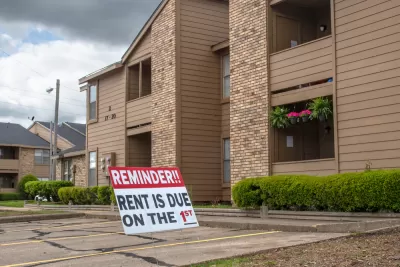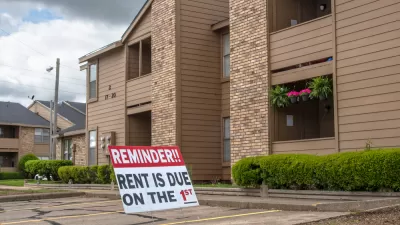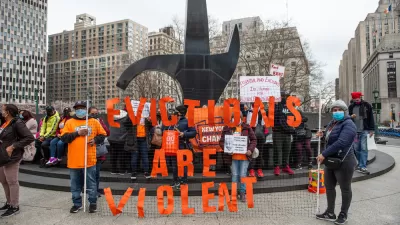As Americans deal with job losses and ongoing unemployment, rent bills are piling up and a wave of evictions looms on the horizon.

Americans are falling behind economically, according to a pair of studies released at the end of September, and the bills are piling up.
“Renter households across the U.S. are on track to owe as much as $34 billion in past-due rent by January and up to 8.4 million of those households could be hit with an eviction filing by that time,” reports Bill Lucia.
The information comes from a new report published by the National Council of State Housing Agencies last week. The report was prepared by the advisory firm Stout, Risius Ross LLC.
Using data from the U.S. Census Bureau, “the analysis concluded that, based on survey data from mid-September, between 9.7 million and 14.2 million renter households, or 23 million to 34 million individual renters, were falling behind on rent,” explains Lucia.
“The report estimates that the rent shortfall in September for these renters was in the $12 billion to $16 billion range, and that it rises to $25 billion to $34 billion by January.”
Another study, published by the Pew Research Center at the end of September, found that one-in-four Americans are having trouble paying the bills during the pandemic, with lower-income Americans are more likely to have trouble paying bills during the pandemic. The report also finds higher likelihoods of job losses among young Americans and low-income Americans.
FULL STORY: Overdue Rent is Piling Up and Could Total $34 Billion by January, Estimates Show

Alabama: Trump Terminates Settlements for Black Communities Harmed By Raw Sewage
Trump deemed the landmark civil rights agreement “illegal DEI and environmental justice policy.”

Planetizen Federal Action Tracker
A weekly monitor of how Trump’s orders and actions are impacting planners and planning in America.

The 120 Year Old Tiny Home Villages That Sheltered San Francisco’s Earthquake Refugees
More than a century ago, San Francisco mobilized to house thousands of residents displaced by the 1906 earthquake. Could their strategy offer a model for the present?

In Both Crashes and Crime, Public Transportation is Far Safer than Driving
Contrary to popular assumptions, public transportation has far lower crash and crime rates than automobile travel. For safer communities, improve and encourage transit travel.

Report: Zoning Reforms Should Complement Nashville’s Ambitious Transit Plan
Without reform, restrictive zoning codes will limit the impact of the city’s planned transit expansion and could exclude some of the residents who depend on transit the most.

Judge Orders Release of Frozen IRA, IIJA Funding
The decision is a victory for environmental groups who charged that freezing funds for critical infrastructure and disaster response programs caused “real and irreparable harm” to communities.
Urban Design for Planners 1: Software Tools
This six-course series explores essential urban design concepts using open source software and equips planners with the tools they need to participate fully in the urban design process.
Planning for Universal Design
Learn the tools for implementing Universal Design in planning regulations.
Clanton & Associates, Inc.
Jessamine County Fiscal Court
Institute for Housing and Urban Development Studies (IHS)
City of Grandview
Harvard GSD Executive Education
Toledo-Lucas County Plan Commissions
Salt Lake City
NYU Wagner Graduate School of Public Service





























